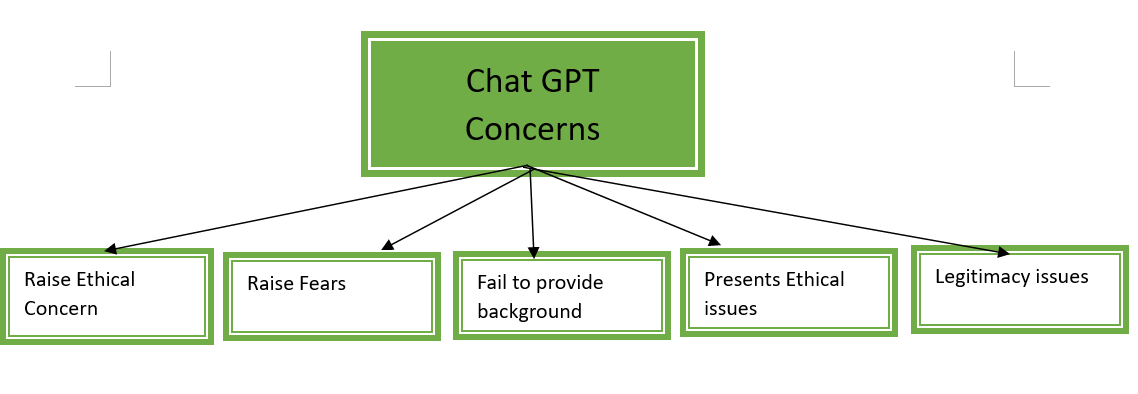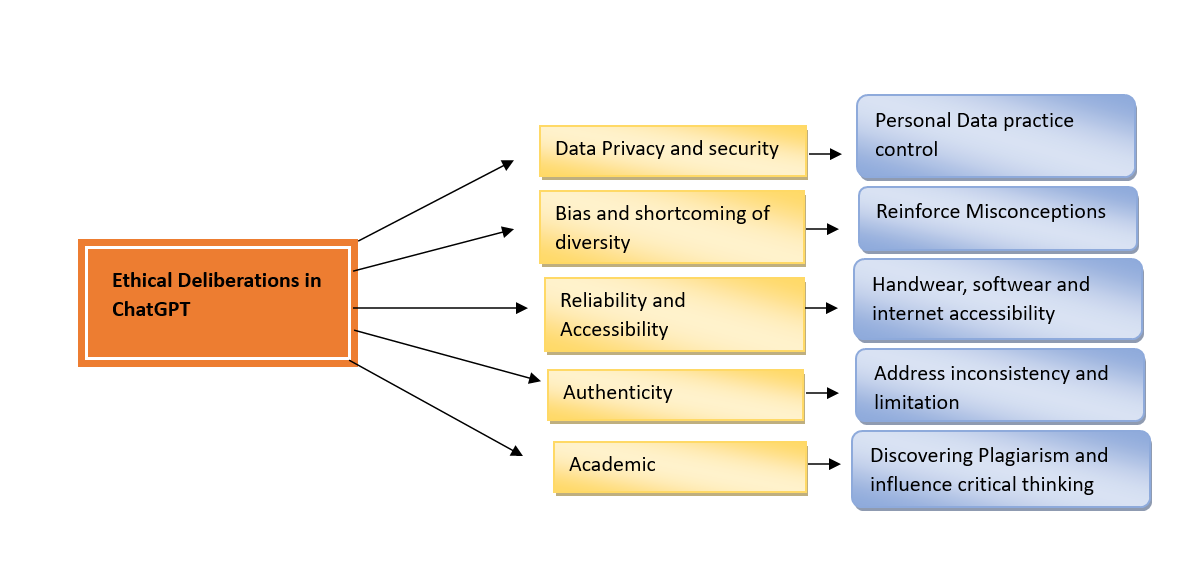By: Ankita Manohar Walawalkar; Department of Business Administration, Asia University
Abstract:
The article discusses the ethical implications of incorporating ChatGPT into language instruction, with a particular focus on confidentiality, bias, dependability, accessibility, genuineness, and academic credibility. As Artificial Intelligence AI progresses, educators must be diligent in assessing its ramifications. This Article follows systematic literature review method for the deep understanding of concepts. Understanding these consequences allows learners, educators, and administrators to make educated judgments about the proper application of ChatGPT in language learning.
Introduction:
AI chatbots such as ChatGPT have changed language learning. OpenAI’s large language model (LLM) simulates human conversation through the generation of human-like answers to text sources [1] [2]. Users can send requests in natural language, and ChatGPT matches responses to requests, making it a valuable resource for language learners seeking interactive chats with AI-powered instructors. The study examines the ethical concerns of using LLMs such as ChatGPT in language learning, including privacy, bias, accessibility, dependability, authenticity, and academic credibility. It emphasizes the significance of addressing these features before integrating ChatGPT into the language classroom [3].

Ethical Deliberations
1.1 Data Privacy and Security
ChatGPT, an AI model for learning a language, offers issues of ethics related to privacy and security. It involves an enormous quantity of data, including information provided by users during interactions, raising is concerned about data privacy and security[3][2]. The information collected may be applied for explanations other than education, such as improving model performance and conducting research. This constitutes issues of authorization transparency and control. Learners should be completely conscious of the data accumulating processes and have control over how their personal data is used and shared [4].
1.2 Bias and Deficiency of Diversity
Another important ethical fear with using ChatGPT is bias. Biases have been identified in massive data sets utilized for training LLM models. Language learning models (LLMs) may strengthen misconceptions, prejudice, and bias in communication interactions [5]. This perpetuates existing cultural biases and injustice, potentially influencing educational processes and outcomes. Language frequently reflects human values, identities, and opinions, therefore using internet content to train LLMs can produce value-laden outcomes. Studies showed continuing biases against gender, race, and religion in these outcomes [3].
1.3Accessibility and Reliability
AI systems ought to encourage global justice and equal access to learning a language, regardless of economic standing, abilities, or constraints. fortunately, the use of ChatGPT in language learning raises queries regarding access because it might require particular hardware, software, or internet access that is not available or cost-effective to all learners. This discrepancy may bring disparities into the assessment process[2] [1]. Despite the globe’s population’s digital propagate, internet availability and access vary widely, with an average internet use rate of 64.6%. Inequality of access can generate differences and prevent certain learners from using ChatGPT and other AI-powered applications. Furthermore, the reliability of ChatGPT’s ability to generate text that mimics human language could pose an issue for learners in differentiating between confirmed knowledge and false data [5].
1.4 Authenticity
ChatGPT could fail to provide students with the social, emotional, and cultural background required for successful language learning[5]. This raise worries regarding the potential limitations and inconsistencies in AI-generated data, as well as the likelihood that learners might develop skills in language that are separated from real-life conversations, resulting in a superficial grasp of language and culture [4].
1.5 Academic Dishonesty
The usage of ChatGPT in teaching presents ethical issues concerning academic integrity. Language learners may use ChatGPT to complete linguistic projects or assessments, which could result in plagiarism, cheating, and compromising the validity of what they have produced. They can also use ChatGPT to create written essays in their native tongue and submit them as their own pieces of writing [2]. They can cheat on tests in real time, impacting exam integrity and possibly leading to incorrect evaluations of candidates’ abilities and expertise. Teachers and educators are discovering it harder and harder to distinguish between machine-generated and human-generated material. AI-generated detection innovations can identify patterns or deviations in written content, but ChatGPT’s distinctive text renders it indistinguishable. Additionally, ChatGPT could have an adverse effect on learners’ critical thinking, and experience with and knowledge about research [1].

Conclusion
The incorporation of AI-powered tools such as ChatGPT into the teaching of languages necessitates an intentional strategy that emphasizes safeguarding privacy, bias mitigation, access, genuineness, and academic integrity [1]. This strategy may maximize the benefits of AI-powered language acquisition tools while minimizing possible risks, leading to a more welcoming, equitable, and efficient learning environment. It may be beneficial for educators to inform student on the weaknesses and ethical issues related to AI tools [3].
Reference:
- L. Kohnke, B. L. Moorhouse, and D. Zou, “ChatGPT for Language Teaching and Learning,” RELC J., vol. 54, no. 2, pp. 537–550, Aug. 2023, doi: 10.1177/00336882231162868.
- S. A. Bin-Nashwan, M. Sadallah, and M. Bouteraa, “Use of ChatGPT in academia: Academic integrity hangs in the balance,” Technol. Soc., vol. 75, p. 102370, Nov. 2023, doi: 10.1016/j.techsoc.2023.102370.
- S. Vaccino-Salvadore, “Exploring the Ethical Dimensions of Using ChatGPT in Language Learning and Beyond,” Languages, vol. 8, no. 3, Art. no. 3, Sep. 2023, doi: 10.3390/languages8030191.
- “Best Practices in Data Collection and Preparation: Recommendations for Reviewers, Editors, and Authors – Herman Aguinis, N. Sharon Hill, James R. Bailey, 2021.” Accessed: Feb. 26, 2024. [Online]. Available: https://journals.sagepub.com/doi/abs/10.1177/1094428119836485?journalCode=orma
- “The ethics of ChatGPT – Exploring the ethical issues of an emerging technology – ScienceDirect.” Accessed: Feb. 26, 2024. [Online]. Available: https://www.sciencedirect.com/science/article/pii/S0268401223000816
Cite As:
Walawalkar A M (2024) Artificial Intelligence Ethics: Language Learning & Beyond considering ChatGPT, Insights2Techinfo, pp.1